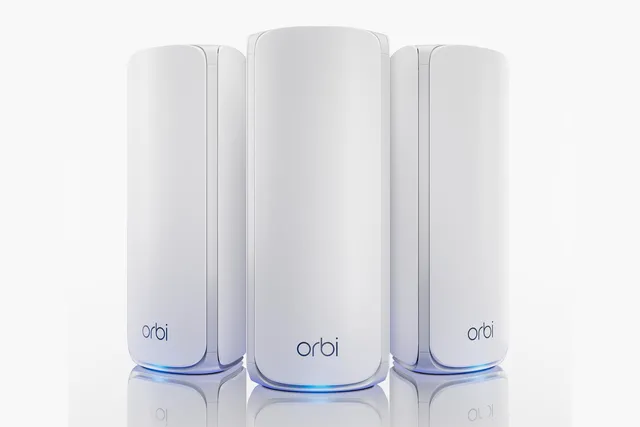Netgear announced two new Wi-Fi 7 routers today: the Nighthawk RS300 and the Orbi 770. Both routers will come with 2.5Gbps ports and the benefits of Wi-Fi 7, such as 320Mhz channels that can potentially double wireless bandwidth for compatible hardware, but with lower prices this time around.
The Orbi 770 router has four 2.5Gbps ports: one to connect to your modem for internet access and three to distribute that to any devices you want to wire up. The satellite mesh nodes each have two 2.5Gbps ports, too, letting you connect more devices to those or wire them straight to the main one. That compares to its more expensive predecessor, the Orbi 970, which has two 10Gbps ports and three 2.5Gbps ports. Netgear also says the Orbi 970 offers up to 27Gbps total bandwidth versus the Orbi 770’s 11Gbps thanks to an extra wireless band, but that won’t speed up your experience on any one device.
To get the benefit of the 320MHz channels, you’ll need a phone, laptop, or other device with Wi-Fi 7 capability connected to the 6GHz band. The 5GHz band also gets a broader 240MHz spectrum — which, again, you’ll need a Wi-Fi 7 device to take advantage of.
The Orbi 770 goes for $999.99 for a three-pack, which may seem pricey (because it is) but is easier to swallow than the whopping $1,699.99 per three-pack that Netgear asks for the Orbi 970.

MLO means more stable backhaul connections between mesh points.Image: Netgear
The big benefit for these routers, as with most mesh Wi-Fi 7 routers, lies in Multi-Link Operation (MLO), a new feature in the Wi-Fi 7 standard that allows for simultaneous connections on two bands and, therefore, a faster, more stable connection. While none of your pre-Wi-Fi 7 devices can take direct advantage of MLO, the Orbi and its satellites can connect to each other this way. That means your mesh network should be less prone to congestion on a single band, and if one band goes down, you still have the other one to work with.
:format(webp)/cdn.vox-cdn.com/uploads/chorus_asset/file/25486412/Screenshot_2024_06_11_at_7.47.59_AM.png)
Image: Netgear
The Nighthawk RS300 is likewise a tri-band router, with similar specs to the primary Orbi router but with a couple of key differences. The 6GHz band will still support 320MHz channel bandwidth, but the 5GHz is limited to 160MHz. (That’s still the fastest you can expect on any non-Wi-Fi 7 device, though.)
On the back, you’ll find one 2.5Gbps ethernet port for connecting to your modem, plus three more ethernet ports (two 2.5Gbps, one gigabit) for sending wired internet to your devices. It also has a USB 3.0 port if you want to connect something like a storage drive to it. Netgear says it’s good for about 2,500 square feet of coverage (though that will always depend on where you put it and what’s in your home) and supports up to 100 devices.
The Orbi 770 will be $999.99 for a three-pack and $699.99 for a two-pack, while the Nighthawk RS300 is $329.99. They’re available for preorder now on Netgear’s site but will come to other retailers later on, according to the company.





